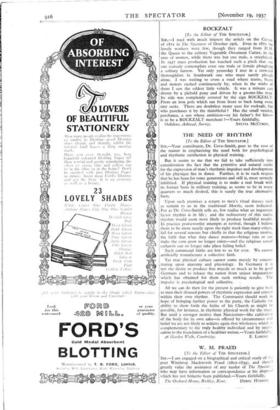THE NEED OF RHYTHM
[To the Editor of THE SPECTATOR.]
SIR,—Your contributor, Dr. 'Cove-Smith, goes to the root of the matter in emphasising the need both for psychological and rhythmic satisfaction in physical training.
But it seems to me that we fail to take sufficiently into consideration the fact that the primitive and natural outlet for the expression of man's rhythmic impulses and development of his physique lies in dance. Further, it is in such respect that he has been for some generations and still is, most severely inhibited. If physical training is to make a real break with its former basis in military training, as seems to be in many quarters so much desired, this is surely the true alternative basis.
Upon such premises a return to men's ritual dances such as remain to us in the traditional Morris, seem indicated. For as Dr. Cove-Smith tells us, few realise what an important factor rhythm is in life ; and the rediscovery of this native rhythm would seem most likely to produce healthful results. In practice praiseworthy attempts at revival, though I believe them to be more nearly upon the right track than many others, fail for several reasons but chiefly in that the religious motive, the faith that what they dance matters—brings rain or can make the corn grow no longer exists—and the religious sexual catharsis can no longer take place failing belief.
Such communal faiths are lost to us for ever. We cannot artificially manufacture a collective faith.
Yet true physical culture cannot come merely by concen- trating upon anatomy and physiology. In Germany it is not the desire to produce fine muscle so much as to be good Germans and to release the , nation from unjust imputations which has obtained for them such striking results. The impulse is psychological and collective. _ .
All we can do then for the present is patiently to give back to men their disused powers of rhythmic expression and control within their own rhythm. The Communist should work in hope of bringing further power to the party, the Catholic for ability to show forth the faiths of his Church as might be possible, for instance, in rhythmic physical work for the stage. But until a stronger motive than Narcissism—like cultivation of the body for its own sake—is offered by circumstance and belief we are not likely to achieve again that wholeness which is complementary to the truly healthy individual and by impli- cation to the foundation of a healthier nation.—Yours faithfully.
46 Garden Walk, Cambridge. E. LORINC'.
















































































































 Previous page
Previous page